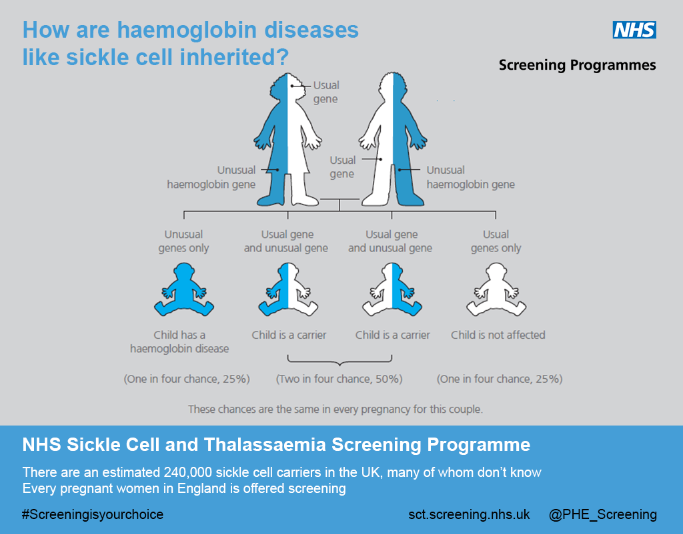I was appointed antenatal and newborn screening coordinator at King’s College Hospital, London, on 1 June 2014.
My job is to coordinate all 6 antenatal and newborn screening programmes at the trust.
Before my appointment, I had 16 years’ experience working as a midwife at the trust. However, I had very limited knowledge and understanding of haemoglobinopathies – the inherited genetic disorders that include sickle cell disease and thalassaemia.
The NHS Sickle Cell and Thalassaemia (SCT) Screening Programme screens pregnant women for these 2 conditions. It also screens newborn babies for sickle cell disease.
My trust has a high prevalence of sickle cell disease and thalassaemia and I regularly deal with colleagues who expect me to be the expert on these conditions.

My manager, who had been a screening coordinator in the past, said it was very important for me to do the genetic risk assessment and counselling module run by King’s College, London.
With every passing day, week month and year, the need to do the course grew stronger. Feedback from other screening coordinators also encouraged me to apply, although I knew funding could be a challenge.
In January 2016, I finally applied for the course. And on 15 March 2016, I was delighted to receive an email confirming that I had received a sought-after bursary from Public Health England to cover the course fees.
I started the course on 12 May 2016 and learnt so much during the first 2 days. The course facilitators were so supportive and employed every possible teaching skill to ensure we understood the foundation topics.
An assignment was given at the end of the first 2 days which made me start exploring the SCT programme. The knowledge gained preparing for this formative assignment help me prepare for the summative assignment due in August.
I promptly applied my newly acquired knowledge to interpreting blood results for SCT screening in daily practice.
I really enjoyed the course and it gave me the chance to network with other colleagues in the field. I have joined the Sickle and Thalassaemia Association of Nurses, Midwives and Allied Professionals (STANMAP) and on 10 November I attended a STANMAP study day where I was able to build on my knowledge.
The course facilitator was very supportive and her timely responses and feedback continued right up to the summative course work due in early August.
I am really grateful to Public Health England for the funding for this course. Since successfully completing it, I am committed to ensuring that the provision of SCT screening in my trust is robust.
I now feel safe, confident and competent in my role as a screening coordinator in interpreting unusual haemoglobinopathy results and their significance and supporting colleagues.
I learnt from the course that Haemoglobin AS and AC meant 2 different things. Since then I have been able to correct colleagues making the same mistake in interpreting haemoglobin C carrier results.
For details of how to apply for a bursary to attend the 4-day King's College London risk assessment and counselling module (11 and 12 May and 15 and 16 June 2017) visit the screening CPD website. The deadline for applying for a bursary is 6 February 2017.
SCT screening e-learning is also on the CPD site.
PHE Screening blogs
PHE Screening BLOGs provide up to date news from all NHS screening programmes – replacing our previously published newsletters.
You can register to receive updates direct to your inbox, so there’s no need to keep checking for new blogs.
1 comment
Comment by Amad posted on
It's great to know that the counselling classes are given by the professionals and there are organisation's to support them. Last year, my friend in Dubai had doubts with her symptoms and doctors recommended for a counselling class. The class was very informative and helped to make so many decisions. She got her thalassemia tested from FML Dubai and diagnosed with thalassemia minor. A genetic counselling is an important process before a genetic screening tests and the final decision depends on the counselling class.